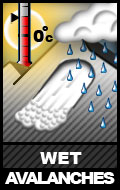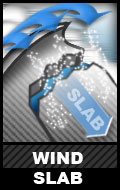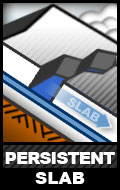***This is the final advisory for the 2013-14 season. We will provide an update and season summary in the coming weeks. If you find this information valuable and would like to see this program continue for seasons to come, please make a tax-deductible donation.
Saturday & Sunday:
Click here to view the complete danger scale
Avalanche danger is expected to be moderate through the weekend – lower earlier in the day, increasing later due to warming and solar radiation. The possibility of upper elevation (above ~4000′) wind slabs in areas that have received fresh snow since Wednesday has increased.
Concerns:
Click the above icon for a general overview of wet avalanches
Click here to learn more about loose wet avalanche problems and how to manage them
Click here to learn more about wet slab avalanche problems and how to manage them
Wet avalanche activity will primarily be human triggered wet loose (sluff) avalanches later in the day predominantly on south and west aspects. However, the snowpack still harbors persistent weak layers deeper within it which may again become reactive and produce larger wet slab avalanches as meltwater percolates through and the snowpack loses strength. Such wet slab avalanches can be human triggered (likely breaking at or below the trigger), but may occur naturally as well.
Be mindful of how wet the snowpack is becoming. As the snow becomes increasingly wet and unsupportable, so will the likelihood and danger of wet avalanches increase.
Click here to learn more about this type of problem and how to manage it
Southeast winds are forecast to be strong through Saturday night, but the loose snow required for building wind slabs on leeward aspects is limited. However, deeper and higher in the mountains of Chugach State Park, showers have brought fresh snow since Wednesday. Relatively small wind slabs are thus a possibility. Such wind slabs should be relegated to elevations above ~4000′ and are expected to bond relatively quickly.
Click here to learn more about this type of problem and how to manage it
Large, looming late season cornices will become less stable and more apt to fall as a result of warm temperatures and solar radiation. Cornices at higher elevations (above ~4000′) may also have grown this week, or have the potential to grow through this weekend, due to new snow and strong winds. At elevations where cornices could have grown or have the potential to grow, warmth and solar radiation should have less of a destabilizing effect. However, recently formed cornice growths are expected to be sensitive and unstable.
Cornice falls pose an inherent hazard as well as their ability to trigger subsequent avalanches.
Click here to learn more about this type of problem and how to manage it
This problem, in part, goes hand-in-hand with the wet avalanche problem. As mentioned above, deeper persistent weak layers within the snowpack will lose strength as meltwater percolates through which would weaken existing bonds between snow grains and could produce wet slab avalanches. More specifically, depth hoar and basal facet layers still exist (even on the more solar aspects in some areas) and could result in the most consequential wet avalanches.
Additionally, on higher and drier northerly aspects persistent slabs are very unlikely but aren’t completely out of the question.
Mountain Weather:
Saturday: Strong SE wind with passing snow and rain showers. Otherwise, partly sunny with temps in the lower 30s-40s.
Sunday: Partly sunny with light-moderate SE wind and temps in the lower 30s-40s.




